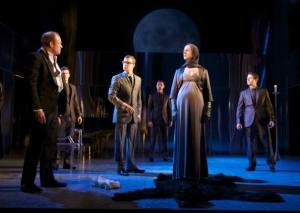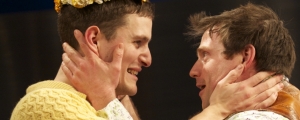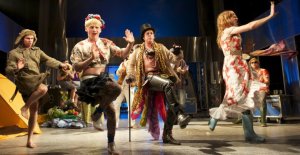The Winter’s Tale directed by Edward Hall and performed by Propeller at the Sheffield Lyceum, 4th February 2012.
My blogging time these days is largely taken up with adding transcripts and rough drafts to my private PhD blog in preparation for meeting with my Thesis Advisory Panel at the end of the summer term. Thus, current posts here are likely to be both brief and belated. However, I really would be missing a trick if I failed to mention the recent production of The Winter’s Tale by Propeller.
Of course, it’s not intercultural, but as with Shakesqueer, I will allow myself some leeway in my blog theme by redefining the word trans-cultural to include trans-gender/cross-gender approaches.
I had heard much about this all-male company, who resist traditional travesti performance codes by neither fully inhabiting ‘femaleness’ nor by playing the (pantomime) dame. This is not to say that there is no element of drag: even (especially) without make-up or wigs, the men’s female clothing acts to re-emphasise their maleness, be it baldness or beer-gut. However, by acting into the words, not the ‘parts’, gender – which at the outset of the performance dominates the audience’s attention in a very simplistic way – becomes increasingly problematised. At one level, it is an irrelevance, whilst paradoxically, at another it is intensified.
Let me try to explain what I mean through example. Hermione, played by the shorn-headed Richard Dempsey, replete with the bulging womb of a pregnant man, is both female and male. Standing shoulder to shoulder with his wife, Leontes’ (Robert Hands’) perverse imaginings reflect back on himself, transforming the misogynistic field of his verbal abuse into one of sexual self-loathing. Likewise, when Hermione goes on trial, in what has become the familiar performance garb of a woman who has had her child hauled from her bloody loins, the now-blunted shock of this image is sharpened through simple defamiliarisation. Dempsey, with a man’s (the guard’s?) oversized overcoat thrown over his rags, recalls an inmate of a concentration camp, stripped of all identifying features. His (her) defence is not that of a woman against a man’s tyranny, but against tyranny itself in Sicilia.
Vince Leigh’s rugby-player Paulina stands a head above all the male courtiers and speaks half an octave lower, his/her physical dominance matched by the verbal. Ben Allen’s roles are complex: the pyjama’d man-boy Mamillius, who opens the play bewitched by a trickle of sand, becomes Time holding an hourglass, becomes Perdita, the echo of Mamillius in a dress.
In Bohemia, nothing is as it seems, and in this production the doubleness of this apparently bucolic paradise is doubly emphasised – and quite hilariously. The all singing, all dancing sheep are cross-dressing men in wooly wigs and miniskirts (if my memory serves me correctly), Camillo and Polixenes infiltrate the Glastonbury Sheep-Shearing Fest as Arkela and Brown Owl, and I’m really not sure whether Autolycus is Tom Jones or Alice Cooper. Richard Dempsey returns as Dorcas, this time in lipstick and golden tresses and festival wellies. And this time he really is transformed into a rather attractive and convincing woman, but this in itself, in the context of this company and this production, ensures that we never forget that he really isn’t. However, if you ask me, Perdita and Florizel really are two boys in love, adding a whole new level of transgression to their already transgressive* relationship. Except the transgression is not on the stage but in the eyes of the spectators.
By focussing on gender representation (or non-representation), I have of course only engaged with one facet of this production. However, it seems to me that companies like Propeller and Two Gents Productions (coming soon!) are bringing an immediacy to Shakespeare through crossing gender boundaries in the same way that transcultured productions are actually bringing Shakespeare home.
*Re-reading this in 2018 after seeing Ben Allen in Antony and Cleopatra at the Barbican has made me realise how normalised our queer lives have become in a relatively short space of time.


